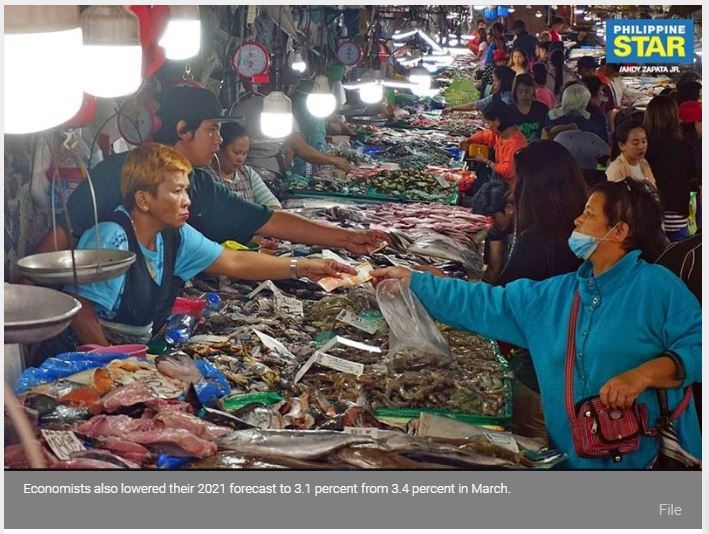Philippines: Economists slash inflation forecasts
MANILA, Philippines — Economists of private banks lowered anew their inflation forecasts for this year and next year due to easing global crude oil prices, base effects, implementation of non-monetary policy actions and mitigating measures against El Niño, according to the results of a survey conducted by the Bangko Sentral ng Pilipinas.
Dennis Lapid, officer-in-charge of the BSP’s Monetary Policy Sub-Sector (MPSS), said results of the survey of private sector economists for June showed a lower mean inflation forecast for 2019 at 2.9 percent versus the March projection of 3.3 percent and for 2020 at 3.2 percent instead of 3.4 percent.
Economists also lowered their 2021 forecast to 3.1 percent from 3.4 percent in March.
“Private sector economists’ mean inflation forecasts for 2019 to 2021 are lower,” Lapid said.
There were 27 respondents in the survey of private sector economists conducted between June 7 and June 17.
“Analysts expect inflation to remain manageable and within the government’s target range, with risks to the inflation outlook likely to be broadly balanced,” he said.
Maybank has the highest inflation forecast of 3.8 percent for 2019 followed by Al-Amanah Islamic Bank and CTBC Bank with 3.5 percent; China Bank with 3.4 percent; ING, BDO, and Unionbank with 3.2 percent; and Korea Exchange Bank with 3.1 percent.
For 2020, Standard Chartered Bank has the highest inflation forecast at 4.2 percent followed by Al-Amanah Islamic Bank, CTBC Bank and Barclays with 3.5 percent; Metropolitan Bank & Trust Co. with a range of 2.5 to 3.5 percent; Bank of the Philippine Islands and UBS with 3.4 percent; and Bangkok Bank, China Bank and Maybank with 3.3 percent.
According to Lapid, key upside risks to inflation are seen to emanate from the adverse effect of weather conditions, brought about by weak El Niño condition, on domestic food supply, volatile global crude oil prices, higher domestic demand, particularly in the fourth quarter due to the Christmas season.
Other upside risks include weaker peso against the dollar, higher spending on infrastructure as the government plays catch up due to the delayed passage of the 2019 national budget and the potential impact of African swine fever on local pork prices.
On the other hand, Lapid said possible downside risk to inflation include high base effects and easing global crude oil prices.
According to Lapid, the government also continues to implement non-monetary policy actions to increase domestic food supply and stabilize prices such as the rice tariffication law, rice importations as well as the mitigating measures put in place by the Department of Agriculture against El Niño.
Based on the probability distribution of the forecasts provided by 22 out of 27 respondents, there is a 94.6-percent probability that average inflation for 2019 would settle between the two and four percent range and lower probability of 90.8 percent for 2020.
Source: https://www.philstar.com/business/2019/07/22/1936654/economists-slash-inflation-forecasts#prZepTxe5TDBLY3W.99


 English
English




